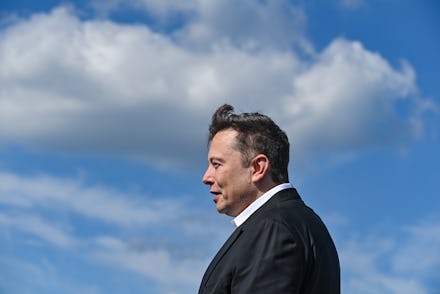Elon Musk has finally realized Bitcoin is awful for the environment

Famed Wario impressionist Elon Musk has been something of a mascot for the cryptocurrency craze, shamelessly shilling for dogecoin, a meme gone too far, and embracing Bitcoin despite the very clear indicators that the cryptocurrency is terrible for the planet. On Wednesday, Musk apparently finally came to terms with that fact. He announced via Twitter that Tesla would no longer accept Bitcoin as payment, citing the surprisingly (to him) massive environmental impact of mining for the cryptocurrency.
While Musk defended cryptocurrency in general as "a good idea," the Tesla and SpaceX CEO said that he is "concerned about the rapidly increasing use of fossil fuels for Bitcoin mining and transactions." In a follow up tweet, Musk said that Bitcoin's "energy usage trend over past few months is insane," citing the University of Cambridge's Bitcoin Electricity Consumption Index, which shows the electricity usage for each Bitcoin transaction skyrocketing starting around November 2020.
Musk is right about the environmental costs of Bitcoin. Currently, according to the Digiconomist's Bitcoin Energy Consumption Index, the cryptocurrency's total carbon footprint is about the same as the entire country of Singapore, and each individual transaction consumes the same amount of electricity that a single U.S. home uses over the course of 38 days. This is driven largely by how Bitcoin mining is done, which requires a considerable amount of computing power to complete complex math equations in order to confirm each and every transaction. Bitcoin requires the most energy per transaction, by far, of the major cryptocurrencies.
Luckily, Bitcoin is not the only cryptocurrency out there. It's not even the only one that Musk has publicly stumped for. Dogecoin, his latest obsession that he spent a good chunk of his Saturday Night Live appearance pimping — while also admitting that it's all "a hustle" — uses a fraction of the energy per transaction that Bitcoin does. There's also Ethereum, the cryptocurrency with the second-largest market cap behind Bitcoin, which has laid out a thorough plan to make its blockchain sustainable (though implementation of these changes has been repeatedly delayed). There are additionally dozens of other crypto projects that have been built with sustainability in mind.
Of course, all of this was true in February when Musk announced that Tesla would accept Bitcoin as payment. It was true when the company purchased $1.5 billion worth of the cryptocurrency, and when it sold off 10% of its Bitcoin holdings to make a cool $101 million off it. And let's not forget when Musk very publicly said it was "true" that Bitcoin incentivizes renewable energy — a thing that is not true, actually, as Bitcoin miners flock to cheap energy but don't drive the implementation of renewables and are actually often a strain on those resources.
So what changed? It's hard to say, exactly. Some have theorized that Tesla is unable to report Bitcoin sales as profits, which makes its balance sheet less appealing. Others have pointed to the fact that Tesla is applying to get into the renewable fuel credit market, where it could generate lots of cash by selling renewable energy certificates (RECs) that utilities companies purchase in order to be in compliance with energy regulations. Tesla currently makes more money selling these RECs to other auto manufacturers than it does selling actual vehicles. Ditching Bitcoin might be a move to appease environmental regulators, who do not exactly have a favorable view of the energy-devouring cryptocurrency.
It's possible that Musk's decision to put an end to Tesla's Bitcoin transactions comes from a genuine concern for the planet. But odds are better that it comes from a genuine concern for his bottom line.